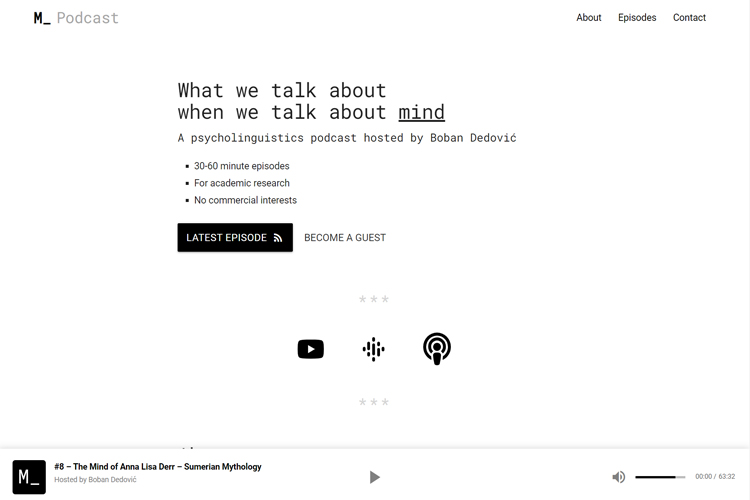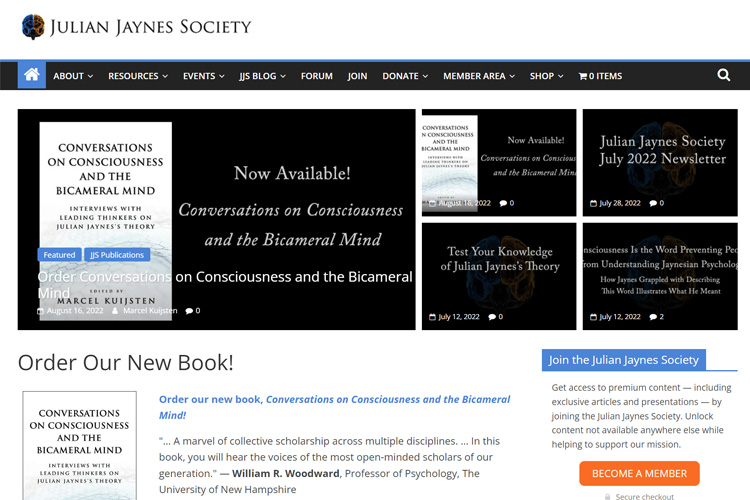Credits
Full Transcript
Boban Dedović Host
00:11 Hello, I'm Boban Dedović, and this is episode three of the "What we talk about when we talk about mind" podcast.
00:20 Today I have the pleasure of speaking with Marcel Kuijsten, who's the founder and executive director of the Julian Jaynes Society. Julian Jaynes was a psychohistorian from the 1970s who published a very influential book called The Origin of Consciousness, and we'll be talking a little bit more about it later. Marcel is also the editor of three books on Jaynes' theory and a new one that we're going to be discussing a little bit today. He's also a co-editor and regular contributor to the Jaynesian, which is the Society's newsletter. He also co-chaired and helped organize the Julian Jaynes Conference, where he was also a speaker. He has spoken on Jaynes' theory in a number of different venues, and I'm very excited to discuss what he talks about when he talks about mind.
Boban Dedović Host
01:10 For today's hat, we have the Greek word θυμός thymos. It appears many times in Homer's Iliad and Odyssey. It normally gets translated as the word "mind" or "heart." According to Jaynes' theory, he believed that the word meant motion or agitation. And θυμός thymos is one of the most commonly used words in all of the Homeric works when it comes to being translated as "mind."

Boban Dedović Host
01:40 And there's also a new book that I recently found which I'd like to recommend. It's called Psychology of English, and it's by Margaret M. Bryant and Janet Aiken. And the book is a pretty short read, but it talks about the logic of grammar, the origins of grammar, and how these aspects of language influence the way we think about the world and express ourselves. Again, it's a pretty short read, but I highly recommend it. It's called Psychology of English by Margaret Bryant and Janet Aiken.
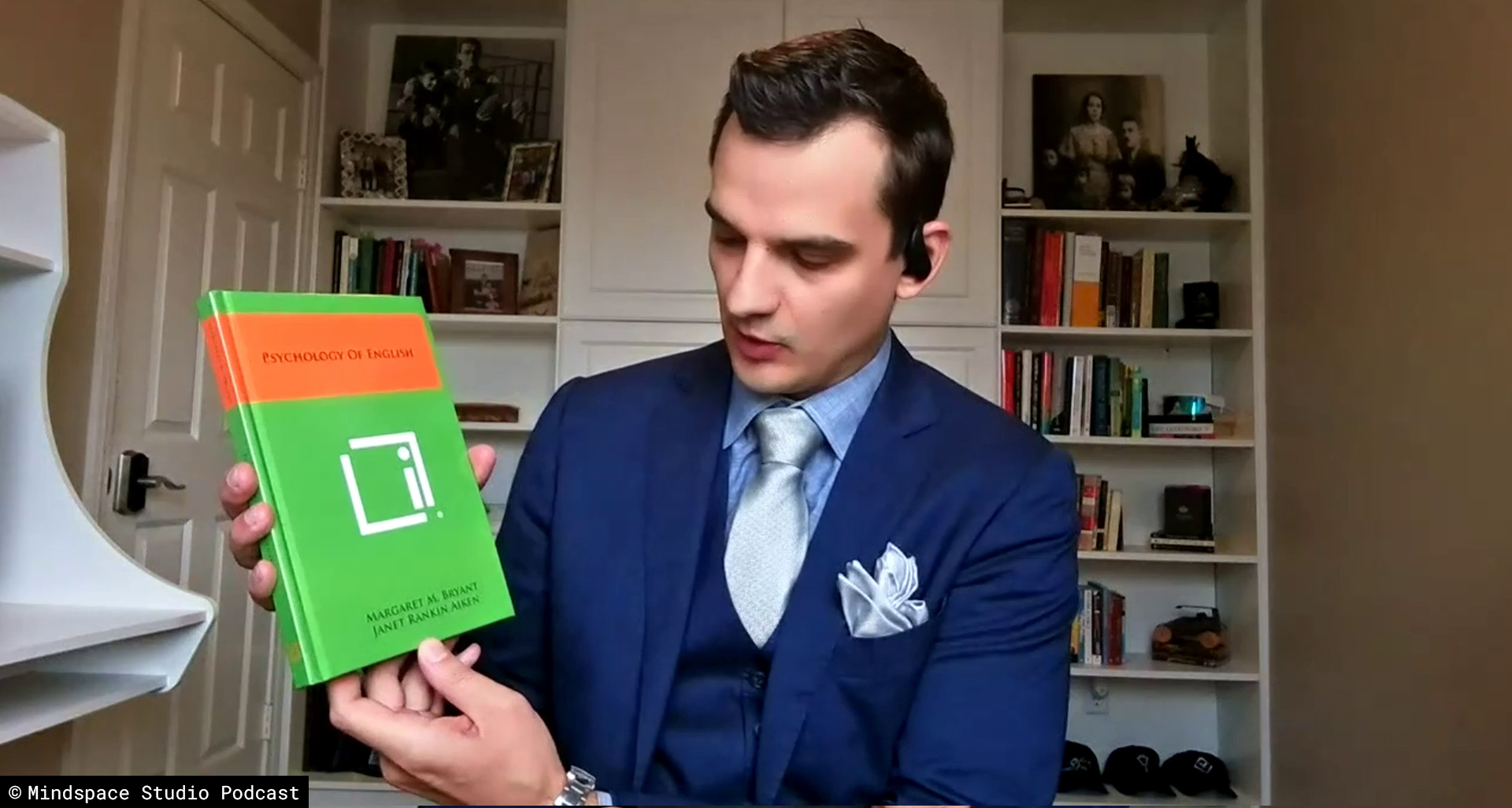
Boban Dedović Host
02:13 Hey, Marcel, how are you doing today?
Marcel Kuijsten Guest
02:16 I'm doing great. Thanks for having me on.
Boban Dedović Host
02:19 Sure. Well, I'm very happy to have you on and I'm very excited to talk about some of your background as well as some of your contributions to the Julian Jaynes Society. But just to get started, for the listeners that maybe aren't familiar with Julian Jaynes, would you be able to tell us a little bit about him and what his theory is about?
Marcel Kuijsten Guest
02:39 Julian Jaynes lectured in the psychology department at Princeton University for more than 25 years, and he published a book that came out in January of 1977 called The Origin of Consciousness and the Breakdown of the Bicameral Mind. And before his book was published, as well as after, he often lectured on his theory.
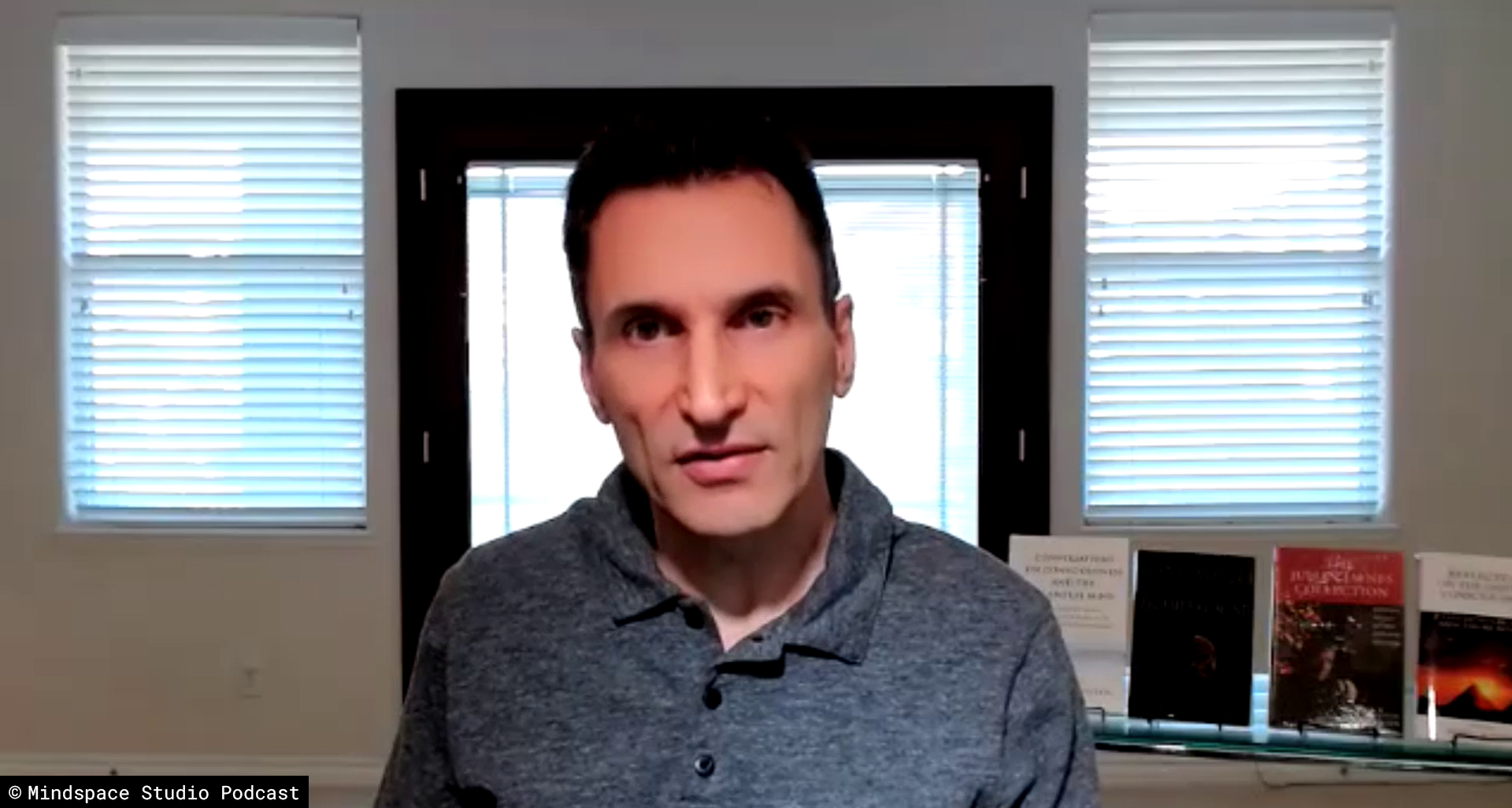
And shortly after the publication of his book, he started presenting his theory as four distinct hypotheses. And I think this makes the theory much easier for people to understand. And those four hypotheses are first off, that consciousness, as he very carefully and narrowly defines it, is based on language. The second is what he called the bicameral mind, or what we now call the bicameral mentality. And that is what he believes was the mentality that predates our learning and development of consciousness. A third hypothesis is dating this transition in history–when did it take place? And looking at everything from ancient texts to archaeological and other evidence, literary evidence of this change in mentality that took place in ancient history. And finally, the fourth hypothesis is what he called his neurological model for bicameral mentality. In other words, what's going on in the brain to facilitate this bicameral mind? And what is it based on physiologically in the brain? So those are the four key ideas, and we can delve further into those, if you'd like.
Boban Dedović Host
04:23 Sure. I really appreciate that answer, and I think I'm very interested in the first part that corresponds to language. Could you talk a little bit more about the role that language has in generating consciousness, according to Jaynes' theory? Or maybe we can talk a little bit about what the function of consciousness really is from a linguistic standpoint.
Marcel Kuijsten Guest
04:50 Right. And the first thing to understand, and this is probably the biggest obstacle for people understanding Jaynes' theory is understanding his definition of consciousness. Because people often, if they're new to the subject matter or if they've come to it from the perspective of other theories, they tend to have adopted very broad, vague definitions of consciousness, equating it with things like just basic awareness. And Jaynes explains in his book very carefully and precisely why we should not define consciousness that way. If we equate it with just basic awareness, things like sense and perception, then essentially all life–all animal life–is conscious, and it kind of makes the term almost meaningless. He explains how even white blood cells can respond to stimuli in their environment. And people who have adopted this broad, vague, awareness sensory perception view of consciousness aren't probably realizing that it would follow that we have millions of conscious beings circulating through our circulatory system. So what Jaynes does is he breaks down all of the things that consciousness is not necessary for and explains how it really is a linguistically based thing that we learn through metaphorical language. And it's uniquely therefore human, and it's unique to humans with language. So infants, before learning language, are not conscious by Jaynes' definition. And for those who haven't read this book, the best way to think about it is "what's introspectable." The introspectable thoughts you have in your mind, which are often linguistically based that allow you to imagine yourself in the future, reflect on the past. It's also, Jaynes sometimes talked about an awareness of awareness. That's the kind of thing he's getting at with his definition of consciousness. So that's very important to understand because if one doesn't understand how Jaynes is defining consciousness, the rest of the theory really won't make sense. So what he then goes on to explain is that in order to build up this inner mental space, this interiority, we need to have first developed language to a certain point where metaphors of the physical world generate this inner mental space. And child development psychologists have been doing studies since the publication of Jaynes' book that really seem to bear this out; that as children learn language, they develop consciousness. And that there's what some theorists describe as different levels, even of consciousness that they go through as they learn language. And children who, for whatever reason, due to neglect or very extremely abusive circumstances, who don't learn language, cases that have been studied, such as there's a famous case of a girl named Genie in Los Angeles in the late 70s. They seem to lack some of the features of consciousness that Jaynes identifies because they didn't learn language during the critical window for language acquisition.
Boban Dedović Host
08:27 Interesting. Thank you for that very thorough and clear answer. Before this interview, in preparation, I did get a chance to read the chapter you're referencing. It's in book one, chapter two, called Consciousness. And I did notice that Jaynes was very clear to differentiate between what you called sensory perception or just reactivity versus all these other definitions, kind of like if we fall asleep or if we're put under anesthesia. There needs to be more careful differentiation there. And with respect to the feral of children, I'm very familiar with the case of Helen Keller where she had to learn language and had to learn idioms and metaphor that corresponds to what you're saying. And there are, of course, other terrible case studies of parents doing that wherein the children just behave like zoo animals.
Boban Dedović Host
09:22 You already mentioned that language was important to consciousness because it had to be learned by children in every subsequent generation, and it sounds like there are a lot of misconceptions about Jaynes' theory. Could you outline what some of these are for us?
Marcel Kuijsten Guest
09:40 Sure. There's quite a number of different misconceptions. The first really is just that people take their broad, vague definition of consciousness as they've internalized, and often, without reading Jaynes' book, they impose that broad, vague definition and assume that their definition is the same as Jaynes' without taking the time to really understand his theory. And Jaynes' discussion of what consciousness is and is not is, after more than 40 years, probably still the best discussion of the subject matter that's out there. He was so far ahead of his time on this, and almost every week, certainly every month, I see something published discussing consciousness that completely fails to grasp these concepts that Jaynes laid out. So anyone in the consciousness studies field I think would really benefit from reading Jaynes' first several chapters. I think it really clarifies this issue. And so, really, the biggest misconception or misunderstanding is just simply swapping Jaynes' very narrow, precise definition with a very broad, vague one. And this kind of is something we inherited from Charles Darwin's theory of evolution. It was just sort of implied that as life evolved, consciousness at some point was a product of biological evolution. And this is a deeply internalized idea, even though there's really no evidence to support it. And so that's kind of what Jaynes tries to break down and explain in great detail why that's not supported by historical evidence. So that's number one. There's quite a few others we can touch on. There's one that's kind of interesting. It's called the mirror test, and it has to do with different scholars who have put forward this idea that once an animal recognizes itself in a mirror, that is the hallmark of self awareness, self consciousness, introspection, whatever word you want to use for how Jaynes is using the word consciousness. And Jaynes explained that that's really a mistake and coming from the behaviorist tradition, Jaynes was familiar with a study that had been done in the 1950s by B. F. Skinner, who trained pigeons to use a mirror as a tool to recognize a spot on their body that they could not see without using the mirror. And so Jaynes explains that as interesting and as fascinating as it is for a chimpanzee, in this case a pigeon, other animals to recognize their bodily reflection in a mirror, that's really all it is. It's a reflection of bodily awareness. They're making a point to point association between a spot on their body and using the mirror as a tool. It has nothing to do with the type of consciousness that Jaynes is describing that we seem to have developed just 3000 years ago. And another way of explaining this that sometimes helps people is to imagine: if I say to you, what are you planning to dress up as next Halloween? And you can go in your mind and imagine in the future a Halloween party you might attend and what costume you'd like to use. And there's no evidence of that kind of thing present in non-human animals. And I know a child who is very minimally linguistic and you see the same kind of thing. If you hold up two costumes, he can state a preference for one or the other. But if you asked him what would you like to be for Halloween next month or next year, he can't even comprehend the question. And it is difficult to tease these things out between language development and other developmental disabilities and things like that. But that kind of gets to what Jaynes is talking about. So dispelling this myth that the mirror test equates the emergence of introspective consciousness, I think is very important. There's a number of others, we can go down the list, if you'd like.
Boban Dedović Host
14:30 Just to touch on a few important ones related to language. First, I saw a cover on Time magazine. It was of a chimpanzee, I believe, holding an iPhone, and the headline that monkeys are conscious like humans. And I read through it and I definitely understood Jaynes' frustration as well as some of the misconception there, because the behavior between humans and chimpanzees is quite different in terms of accomplishments and what can be observed.
Boban Dedović Host
15:03 And to the second part of what you said about the question of what would you like to do or what would you do for Halloween, I do recall there is one section, Jaynes refers to this as the "as if" test. And with some people that have schizophrenia, if they're asked "what would you do if you were a doctor?," the person replies "I'm not a doctor," so I think it's pretty good evidence. And it goes along with what Jaynes called narratization, or this, as you described, this capacity to kind of project yourself into the future to simulate different situations, all of course by means of language and using metaphor. And I'm sure you get a lot of misconceptions, so we can just move on to the book and the Society.
Boban Dedović Host
15:55 What's the current state of the theory and what's the progress of the Society?
Marcel Kuijsten Guest
16:01 Okay, so when Jaynes passed away in 1997 is when I started the Julian Jaynes Society. And at that time time, everyone was still kind of expecting a second volume to be published that he had talked about publishing, but he ended up not completing that. It started with a website and a forum, and I started seeing people from all around the world who were really excited to be able to discuss this theory with other people, sometimes for the first time. And again, this was really at the time that the Internet was just gaining like widespread adoption. So that's how the Society started. We ended up publishing a number of different edited volumes on Jaynes' theory. And because there hadn't been a lot of follow up on Jaynes' theory at that point, there were these other myths and misconceptions that, well, it must not be accurate or it was debunked. The one you always hear is, oh, well, Jaynes' theory was debunked and it was repeated, unfortunately, in the popular HBO series Westworld that incorporated Jaynes' bicameral mind theory into the show. But they repeated this misconception and it really just came out of the fact that there wasn't further publications and things of that nature. There was never anything that really in way has debunked Jaynes' theory. There's been critiques, and that's normal. It's the normal process for any new theory to go through rigorous debate and modifications over time as new evidence emerges. But over the past 40 years, we've looked at a lot of different areas of new evidence for each of Jaynes' four hypotheses. And there's a tremendous amount of new evidence for each of those hypotheses. And there's very little, if anything, that contradicts the main important points of what Jaynes was saying. And so we've published three collections up to this point, as well as a book called The Minds of the Bible by Rabbi James Cohn. And in about a month, we're releasing our fourth book called Conversations on Consciousness and the Bicameral Mind. And that's a collection of interviews that was done by myself and another person named Brendan Leahy, talking to academics and scholars from a variety of different disciplines and presenting some of the latest evidence for the theory. Again, clearing up misconceptions, going into new areas of Jaynes' theory and presenting all of that in a conversational format that I think people are going to find very accessible. And it's kind of a fun, easier way to approach some of these difficult ideas.
Boban Dedović Host
18:58 First question is, where should people go to get the book Conversations on Consciousness?
Marcel Kuijsten Guest
19:03 So they can preorder it now from the Julian Jaynes Society website, which is https://julianjaynes.org. Those are going to begin shipping out at the end of July and through the month of August, and then later in the year, towards the end of August, actually, it will be available worldwide on all of Amazon's different websites as well as via special order from most bookstores worldwide.
Boban Dedović Host
19:32 Great. Congratulations. Now, I'd like to talk a little bit about your advisory board because in academia, everyone knows how important consensus is. I saw that the advisory board has grown to have more individuals. Could you talk a little bit about people that are involved and their backgrounds?
Marcel Kuijsten Guest
19:51 Sure, yeah. We have been, in the last couple of years, doing a lot of new things. The Julian Jaynes Society got its 501(c)(3) nonprofit designation a few years ago. So that was a big step.
Marcel Kuijsten Guest
20:05 And we've been expanding the Science Advisory board. We were very excited to have professor of Psychology Martin Seligman join us a little over a year ago. He was a former president of the American Psychological Association. He's someone that's very well known for his work on positive psychology. And he's had a long standing interest in Julian Jaynes' theory. And he was actually a student of Julian Jaynes at Princeton University in, I think, 1966. It might have been the first year that Julian Jaynes taught his course on consciousness at Princeton University. And the ideas stayed with him throughout his life. And he's also published some articles looking at different aspects of Jaynes' theories, such as the concept of agency and how we see that change in ancient texts, contrasting, say, the Iliad with the Odyssey. We had someone named Lawrence Sugarman join us as well. And he had reached out to me. He was writing a paper on hypnosis, and he is an expert on clinical hypnosis. He's also a pediatrician and an expert on autism, among other things. And he's at the Rochester Institute of Technology in New York. And I helped him with the Jaynesian aspects for his paper. And then we ended up doing an interview for the new book. And he's joined the Science Advisory Board as well. So we're really happy to have him on board.
Marcel Kuijsten Guest
21:41 And just this week, we welcomed Dr. Clive Svendsen to the Science Advisory Board. He's a neuroscientist who did his doctorate at Cambridge University, his undergraduate work at Harvard University, and he's currently at Cedars-Sinai Medical Center in Los Angeles, where he heads up a research institute with more than 120 staff members doing cutting edge research on stem cells and stem cell therapies for things like Alzheimer's disease and dementia. And he is, of course, an expert on neuroscience. And we're really happy to be able to have his input on some of the neuroscientific aspects of Jaynes' theory. And possibly we'll be engaging with him on future collaborations and possibly original research. So we're very excited about that.
Boban Dedović Host
22:43 Congratulations. Those people really sound like heavy-hitters. Now, I want to ask you, what are some of the recent findings from your latest book about the relationship between language and psychology?
Marcel Kuijsten Guest
22:56 Well, there's a number of chapters that address Jaynes' first hypothesis. In the first one, I kind of give an overview, and then I go through some of these studies that we've touched on earlier, talking about feral children who don't learn language and the deficits you see. There's some quotes from Helen Keller's autobiography where she talks about when she first acquired language, the psychological transition that she went through, and how she describes very clearly that she felt like she was sort of in an animal-like state, a permanent present, if you will. And through language she developed these features of consciousness that are very close to what you see Jaynes describing.
Marcel Kuijsten Guest
23:47 There's also an interview with Brian McVeigh, who's a Jaynesian scholar, and he's published a number of books on Jaynes' theory, and he elaborates on some of these features of consciousness that Jaynes describes and how these are developed through metaphorical language. A lot of these concepts are some of the more difficult aspects of Jaynes' theory.
Marcel Kuijsten Guest
24:15 And in the third interview, a professor named Ted Remington really does a fantastic job of breaking down one of the most difficult aspects of Jaynes theory, and that is the different working parts of metaphor that Jaynes identifies. And he explains how Jaynes, who was not involved in the study of rhetoric and linguistics, but he moved the study of metaphor forward in a very profound and significant way, building on, well, expanding on previous work by people like I. A. Richards, and we don't know how much Jaynes was aware of the work of I. A. Richards. He does briefly reference his book. But Jaynes breaks metaphor down into four unique parts. And this is something I think people really need to read to understand, but it really explains how metaphor is not just a trick of language or something that we use to clarify something new by comparing it to something familiar, but it's an essential part of how language grows and how thought and language interact. And in that interview, Professor Remington just does a fantastic job of elucidating all of this and explaining all of these things. And it really goes beyond even Jaynes' explanation because, of course, Jaynes had a whole theory to cover. So read Jaynes' discussion of metaphor in his book and then read Ted Remington's interview because it really clarifies this difficult aspect of Jaynes' theory.
Boban Dedović Host
26:12 Also, I did read Helen Keller's book, and I'm familiar with what she described of what it was like before she had learned language and metaphor. And ironically, she uses a great idiom. She said it was like I was in a mist. And the way she learned metaphor was through putting her hand under the water. That's how her teacher basically taught her. And it's interesting about some of the psychological implications that you also observe. So, for example, her caretaker would say that if she hid food from her, then she wouldn't know where it was. And she would look kind of confused because she didn't understand the concept of once you eat, it basically gets consumed and put in a stomach. So it makes you think, wow, we may take for granted just how important language is with respect to shaping our mentality. And I'll definitely make sure to recommend and cite that chapter by Remington, as well as Jaynes' chapter on consciousness.
Boban Dedović Host
27:18 Now, what areas of language do you think still need to be explored or require more work?
Marcel Kuijsten Guest
27:26 Before we get to that, just I should mention, so no one's left out–Bill Rowe–there's another interview with him, and he does a really good job of going through the child development literature. So that's a really important part of all this. There's a lot of aspects of Jaynes' theory that look at ancient history, ancient texts, archaeology, those kinds of things. And there's a lot of room, possibly, for interpretation in those kinds of things. But with child development, we can look at things in the here and now and in some ways more concretely. And he goes through studies of what's called theory of mind that describe how as children acquire language, they gain this ability to understand that the contents of other people's minds are different from them. And there's well known experiments where they can identify the age where this takes place, where, for example, you have two boxes and you move like some candy from one to the other, and the child that you're asking sees the change. But prior to that, another child saw the candy in the first box, it's moved to the second. And you ask, well, what box is Sally going to think that the candy is in? And before they develop this theory of mind, they say the second box, because that's what they know. But after this milestone in child development, they understand that the other child doesn't know what they know. And there's cross cultural differences in how this develops. And so Bill Rowe does a good job of looking at the child development aspects of how children learn consciousness through language.
Marcel Kuijsten Guest
29:12 And another scholar that I'm not sure if Bill discusses in his interview, but that people can take a look at, is the work of Philip Zelazo and an article he published called The Development of Consciousness. And he has done a lot of great research in this area, and it really goes hand in hand with Jaynes' ideas that children learn consciousness through language. And so there is a great deal of experimental evidence that supports this.
Marcel Kuijsten Guest
29:46 And finally, there's a chapter on consciousness in the Consciousness and Language section by the Dutch philosophy professor Jan Sleutels. And he looks at Jaynes' theories about consciousness and language and then compares and contrasts them to contemporary research in philosophy of mind. And he also breaks down an early critique by a philosopher named Ned Block of Jaynes' theory and explains why that was flawed. So those are the main interviews that we do on consciousness and language, but there's other interviews that do touch on it as well.
Marcel Kuijsten Guest
30:21 And the Stanford anthropology professor Tanya Luhrmann has done some really fascinating research looking at theory of mind in a more broad definition of the term and how that really varies across culturally. And we tend to think that everybody thinks the same way as we do, but we're just now learning, really in recent years, that there's tremendous psychological variability in different cultures and even within individuals, differences in how people experience their inner dialogue and all these types of fascinating things. I think people are really going to enjoy those interviews in the book. And we've so far gotten just a lot of really great positive feedback from the people that have endorsed it thus far.
Boban Dedović Host
31:17 Awesome. Thank you. We'll make sure to highlight that work as well as the contributions of Brian McVeigh, because I know he's done a lot of good work with making sure to explain Jaynes' theory in a very simple way that's approachable by normal people.
Boban Dedović Host
31:33 Now, I know Jaynes was an interdisciplinary scholar, and in my own experience of studying at the University of Maryland, both psychology as well as religions of antiquity, I found sometimes that the word "interdisciplinary" was kind of a dirty word. And I kind of got the sense that Jaynes was or his work was kind of attacked because it is quite intimidating to think about the neurological model, which has to do with one branch of science that is very difficult, as well as linguistics, which I believe to be very difficult as well. Plus, when you throw in the mix ancient texts, there's a lot going on. So I think it's important that we're sitting here talking today, making it more approachable and making sure that people understand the truth of the matter.
Boban Dedović Host
32:30 You mentioned in the fourth hypothesis that Jaynes has a neurological model, and this neurological model has to do with language processing and decision making. Could you talk a little bit about this model just with respect to the language areas of the brain?
Marcel Kuijsten Guest
32:49 Sure. I think first we have to understand what the neurological model is trying to describe, briefly, and that is this bicameral mentality. So, Jaynes, his theory, he was looking for the development of consciousness in the animal kingdom by looking at protozoa and then working his way up to rats and other things like that and realizing that consciousness is not the same as learning. And again, he goes through all of the things that consciousness is not necessary for. In fact, it's important to point this out. Much of our daily life today can be accomplished without consciousness.
Marcel Kuijsten Guest
33:35 Our lives are highly habitual. We still have a lot of instincts. We don't want to talk about that as humans. But we're driven by learning, stimulus response, habitual behavior. And it's only in certain situations that we really rely on our introspectable mind space to resolve problems. I often suggest to people, try to go for a period of time without any inner dialogue. Just see how far you can go. And a lot of your daily routine can be accomplished without any input from an inner dialogue. So that can kind of get at all of the things that are possible for people to do prior to the development of consciousness. People can learn, they can solve complex problems. A lot of problem solving is accomplished nonconsciously and solutions to problems just suddenly come to us from our nonconscious mind. So Jaynes then started tracing back introspection and consciousness through history and looking at ancient texts. And he finds that, lo and behold, in the oldest texts of reliable translations–and I know these are things that you've taken a look at, such as the Iliad – introspection for the most part disappears. And in the place of an inner decision making process, the characters of the Iliad experience a command of a god, and sometimes it's accompanied by a vision.
Marcel Kuijsten Guest
35:22 And these are what we today refer to as auditory and visual hallucinations. And what Jaynes discovered was the ancient world was driven by these commanding voices that people attributed to gods, kings, dead ancestors. It varies depending on the culture that you're looking at. And he thinks how all this came about was that as humans developed language in ancient in the ancient past and again, there's a lot of speculation about when language was first developed in our ancient history, and most of it is really just highly speculative based on anatomical changes and things of that nature. But there's no conclusive evidence about when humans actually began using language, let alone complex language. But Jaynes wrote a great article on this called The Evolution of Language in the Late Pleistocene. It's reprinted in the Julian Jaynes Collection, so people can look at his ideas on language development if they like. But he puts the date much more recently than some people, say, 50-75 to maybe 100,000 years ago when this first started to develop.
Marcel Kuijsten Guest
36:47 And at that point, this was a new technology, if you will, and the brain, which is composed of two separate hemispheres, the right and the left hemisphere, and they're connected by a narrow band of nerve fibers called the corpus callosum. Well, there's a lot of information processing going on in each hemisphere that has to be passed back and forth. And so what better tool to use for this than language? So, as we develop language for interpersonal communication, Jaynes suggests that the brain began using language to communicate with itself between the two hemispheres. And this took the form of what we today would call an auditory hallucination. And he speculated then what might be going on in the brain to facilitate this. And he knew of studies where they had during surgeries where a person's skull was open, stimulated the brain with a mild electrical current.
Marcel Kuijsten Guest
37:58 And when the language areas of the nondominant hemisphere were stimulated, people began often to hear voices and sometimes see visions. And so for the vast majority of people, I think roughly 95%, right handed people have their language in the left hemisphere in what's called Broca's area and Wernicke's area. So Jaynes reasoned, well, what are these same areas in the right hemisphere doing? Nobody seemed to know. Well, these studies of this electrical stimulation seem to suggest that in some people, these nondominant hemisphere language areas become active during stressful situations and initiate an auditory hallucination. It was speculation on his part, but there was other lines of evidence that supported this from the research that was done on what's called split brain patients who've had the corpus callosum severed. And that's a lot of interesting research that we probably won't delve into now, but there were a number of lines of evidence to support this idea that the voices were coming from the language areas of the nondominant hemisphere.
Marcel Kuijsten Guest
39:16 Fast forward to 1999. There were other studies during the 80s that were also supportive of this generally. But then in the UK, a neuroscientist named Belinda Lennox did a study with an fMRI imaging the hallucinations of a schizophrenic person who had regular enough hallucinations that he could press a joystick. At the onset, they would scan his brain, and lo and behold, it was the language areas of the nondominant hemisphere that become active during auditory hallucinations. And since that time, over the past more than 20 years now, there have been many, many replications of that study. So when people today hallucinate, it's a vestige of this bicameral mentality and they're having an interaction between the language areas of the dominant and nondominant hemispheres.
Boban Dedović Host
40:17 Great. Thanks a lot for clarifying that. And I recall also reading a few articles recently that had to do with lucid dreaming, where people become aware of themselves when they're dreaming. And they do this in a medical setting where the experimenters can basically tell if the person's dreaming or so forth through rapid eye movement. And I remember reading something about that sort of activity happening with the language areas.
Boban Dedović Host
40:51 So what happens if these language areas are impacted, according to Jaynes' model?
Marcel Kuijsten Guest
40:57 Well, what do you mean by impacted?
Boban Dedović Host
41:01 One impact could be if you get damage. So, for example, we know that guy, I believe his name was Phineas Gage, that had the iron rod go through a certain part of his brain and everyone thought he was fine, but he lost certain aspects of his personality; and I think his capacity for self-control. And I'm just wondering if you're aware of any research or articles supporting Jaynes' theory that may reference any sort of damage to these language areas of the brain.
Marcel Kuijsten Guest
41:33 Well, there's a lot of relevant things that we could certainly talk about. There's, of course, decades of studies on damage to the language areas due to either disease or damage from accidents, motorcycle accidents, for example, when I was planning on ... [laughter] yeah, something you can speak to. Well, certainly not the neurological damage, but motorcycles are dangerous. And when I was planning on going to a doctoral program in neuroscience, just as a side note, I read a lot of studies and a lot of what we know, the study will start out "...after a tragic motorcycle accident." And I was accepted to the neuroscience programs, but I decided, for a variety of reasons, not to pursue that. But it did scare me from ever getting on a motorcycle. So we have learned a lot from these cases of damage and disease to those areas.
Marcel Kuijsten Guest
42:33 One of the really interesting things that is relevant to Jaynes' theory specifically is what's known as temporal lobe epilepsy. And there we see sort of uncontrolled electrical excitation in the parts of the brain, in this case, the temporal lobe. And there are a number of studies where this type of activity in the nondominant, usually right temporal lobe, has these dramatic, unexpected consequences. And I should have mentioned earlier, in left handed people, laterality is reversed. So they often have their language areas in the right hemisphere. And sometimes it's mixed. So there's some variation depending on handedness. And I should also mention another fascinating aspect of this–laterality–that we'll get to in a second. But with temporal lobe epilepsy, what we see is you have often a completely, let's just call it an ordinary person, not particularly religious, maybe they go to church occasionally, maybe they don't. And then they have this electrical activity in the right temporal lobe and suddenly they demonstrate what's called hyper religiosity. They become obsessed with religion and religious themes to the extent that they might start going around in robes and carrying amulets and carrying around large books of their often hallucinated commandments and things that they believe are coming from outside of themselves.
Marcel Kuijsten Guest
44:13 And you have to step back and think why would that be? Why would activity in this area create hyper religiosity? It's an interesting thing that's been documented in the medical literature, but there's no real explanation unless you understand Julian Jaynes' theory. And it makes sense that as we developed for survival reasons having to do with social cohesion, people's ability to maintain tasks outside of the earshot of a leader or alpha male which allowed population growth and all these kind of things that Jaynes describes in his book, we have in our right temporal lobe this association not only with auditory hallucinations, but also with hyper religiosity.
Marcel Kuijsten Guest
45:04 And these voices had to have a certain level of authority in order to be obeyed. And people who suffer from auditory hallucinations today that are of a nature that's debilitating many people have them and don't mind them or even find them like a helpful guide, but they often are very difficult to be disobeyed, and they have this tremendous association with a higher authority. And so all of this starts to make sense in light of Jaynes' theory.
Marcel Kuijsten Guest
45:39 We also see research by someone named Michael Persinger who had stimulated the right temporal lobe with weak magnetic fields, and it often induces a feeling of a sensed presence or of an imagined other. And so all of these things kind of dovetail to really support Jaynes' theory of bicameral mentality. And there isn't much else out there that would explain any of this.
Marcel Kuijsten Guest
46:07 Now, if I could just briefly go back to the other thing about language and laterality. There's some interesting research that in all people, language is lateralized to varying degrees between the two language areas in the brain that we just talked about. So let's say in some people it's very much lateralized to the left hemisphere. In other people, it's still predominantly in their left hemisphere, but maybe less so. And the degree to which language is processed to a greater degree in the nondominant hemisphere is found to also be predictive of the degree to which they'll experience psychotic symptoms and things like auditory hallucinations. So this, of course, all really dovetails and supports Jaynes' neurological model that the greater activity we have, even for normal language in the nondominant hemisphere, the more predisposed we are to experience auditory hallucinations.
Marcel Kuijsten Guest
47:17 I should just quickly add for people maybe a little skeptical of all of this, auditory hallucinations have become something of a taboo subject, so people tend not to talk about them. And until really the emergence of Jaynes' book, auditory hallucinations in the general population really wasn't studied. But since the publication of Jaynes' Book, there's been hundreds and hundreds of studies showing that they're much, much more common throughout society, through all cultures than was previously known. And millions of people worldwide meet the criteria for schizophrenia. But millions more experience auditory hallucinations to a lesser degree to where they don't seek medical help. They're able to function normally with their voices. And as I said before, some even have a positive relationship with their voices. And I'd encourage again anyone listening–do your own survey of your friends and family and you will be surprised at how many people have heard a voice at some point, sometimes very rarely and sometimes more frequently. So again, what could explain this? It can't possibly be just brain pathology. It's too widespread. It seems to be a holdover from this earlier bicameral mentality.
Boban Dedović Host
48:43 Thanks a lot for sharing that, Marcel. I do have a couple interesting comments that I think are agreeable to what you've shared.
Boban Dedović Host
48:51 The first one is I'm heavily involved right now in the Egyptian language. So I'm reading a lot of books and literature about it. And there's a great book I read recently called The Heart of Wisdom and it just talks about people carrying these amulets and having these very rococo rituals in their daily lives all about this, that, and the other. So that has a very strong historical basis. And I think you brought up a good point about some of these bizarre things that maybe we consider taboo or like you said earlier, people don't like to talk about. For example, there's a middle Egyptian story called the Debate Between a Man and his Ba. And this word Ba is another one of these difficult to negotiate words. And the entire story is basically a conversation between man and himself, he seems to be depressed. And it alludes to all these kinds of themes that you've been talking about. And I say all of that to make this point. Even in ancient studies, this gets tucked under the rug very much, whereas, as Jaynes did, I think we should stop and say, well, wait a minute, what's going on here? This is quite bizarre and it demands an explanation.
Boban Dedović Host
50:12 And the final remark I wanted to make was for a brief period of time, I would do very brief comedy skits. And I did have this one bad joke where I talked with people. That all I looked forward to when I came home after work, was taking a long hot shower and then just replaying the conversations that I had with other people and simulating how they could have gone differently. And it was an awful joke. It was a terrible bit. But so many people went up to me after and said: "oh, you do that too. I thought that was my little secret." So it just goes to show that language plays a really important role and there are some things that problems or issues we can't necessarily resolve unless we feel comfortable as a society talking about them. And a lot of that goes back to taking a look at the work that Jaynes has done and all the other work that your Society has put forth.
Marcel Kuijsten Guest
51:11 Yeah, there was this interesting transition in history. Where for hundreds and hundreds of years, first everyone heard the voices of the gods and the leaders and the kings. And they also, Jaynes believes, had a personal god that helped them with day to day decision making. And the decisions of the community were dictated by the great gods to the leadership, and then communicated verbally like anything else would be. And over time, as consciousness developed through language and writing, that was suppressed. And then it was just certain people, prophets, oracles and these kind of things. None of this has any explanation if we don't look at Jaynes' theory. And then it was certain people in certain places, like the oracle at Delphi, people turned to practices like divination. And there was this tremendous anguish in history at this point over the lost voices of the gods. They considered the gods to be right there with them and not in these faraway, remote places like we do today. And then going up through the middle ages, people would engage in all kinds of different practices to try to still hear the voice of god. There was, of course, the transition from many gods to this idea of one god all around the world, something called the axial age. And people would fast or cut themselves or do different kind of things to try to initiate these bicameral hallucinations.
Marcel Kuijsten Guest
52:53 And then it wasn't until the early 1700s, say, that there was this shift where suddenly we looked at voices now as a sign of mental illness. Before that, you had people like Joan of Ark, of course, Emanuel Swedenborg in Sweden who started a minor religion, many other figures throughout history. But suddenly it became pathologized and so people stopped talking about it. There was a study in the 1800s by Francis Galton, who was a cousin of Charles Darwin who did a rare exception to this, which was the visions of insane persons. And even back then, he found a much higher occurrence of voices and visions than was generally known. And that was about it for the next more than 150 years until Jaynes' book came along. A guy named Posey followed up on that and said, well, this is interesting, we can research this. And he did a study of university students looking at the occurrence of auditory hallucinations. And lo and behold, there was this higher than expected incidence of auditory hallucinations in students. And that inspired many other researchers to look at this issue, to look at, for example, the role of actual auditory hallucinations in children's, imaginary companions and all of these different kinds of things. So it all very much supports what Jaynes was talking about.
Boban Dedović Host
54:30 Well, thank you so much, Marcel. I really appreciate you taking the time to talk about Jaynes' theory, your progress with the Society, as well as how Jaynes' theory relates to the relationship between psychology and language.
Marcel Kuijsten Guest
54:45 Thanks a lot for having me. It's been a lot of fun.
Works Referenced
(In order of appearance)
Margaret M. Bryant and Janet R. Aiken, Psychology of English (New York, NY: Columbia University Press, 1940).
Julian Jaynes, The Origin of Consciousness in the Breakdown of the Bicameral Mind (Boston, MA: Houghton Mifflin, 1976). [https://omnika.conscious.ai/stable/345]
Boban Dedović, “‘Minds’ in ‘Homer’: A Quantitative Psycholinguistic Comparison of the Iliad and Odyssey” (Conference Paper, 12th International Conference on the Mental Lexicon, Niagara-on-the-Lake, Ontario, Canada, October 11–14, 2022). [https://omnika.conscious.ai/stable/193; DOI 10.13016/9hwb-kvrx]
Marcel Kuijsten, ed., Conversations on Consciousness and the Bicameral Mind (Henderson, NV: Julian Jaynes Society, 2022). [https://omnika.conscious.ai/stable/928]
Helen Keller, The Story of My Life (New York, NY: Doubleday, Page, & Company, 1903).
Brian J. McVeigh, The “Other" Psychology of Julian Jaynes: Ancient Languages, Sacred Visions, and Forgotten Mentalities (Exeter, United Kingdom: Andrews UK Limited, 2018).
Rogério Sousa, The Heart of Wisdom: Studies on the Heart Amulet in Ancient Egypt (Oxford, United Kingdom: Archaeopress, 2011).
Transcript Notes
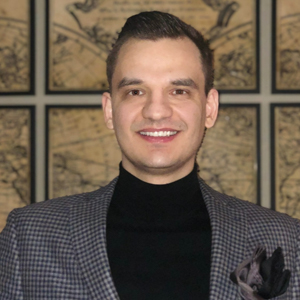
Boban Dedović
Person · Psycholinguist
Boban Dedović (Apr. 8, 1989 –) is a Croatian-American psycholinguist, technologist, scholar of ancient languages, and podcast host. He was born in the former Yugoslavia and moved to the United States at the age of seven. He studied both religions of antiquity (B.A.) and social psychology (B.S.) at University of Maryland in College Park before earning his graduate degree from the University of Chicago... Read more
See also: mindspace.studio bobandedovic.com twitter.com

Mindspace Studio Podcast
Website by Boban Dedović
Mindspace Studio is a psycholinguistics-themed podcast hosted by Boban Dedović, a Croatian-American psycholinguist and technologist. It was started in January of 2021 while Dedović was a graduate researcher at the University of Chicago. The program provides thrity to sixty minute episodes focused on language, psychology, and other related fields of study. It is available on YouTube, Apple Podcasts, and Google Podcasts... Read more
See also: youtube.com podcasts.apple.com podcasts.google.com conscious.ai
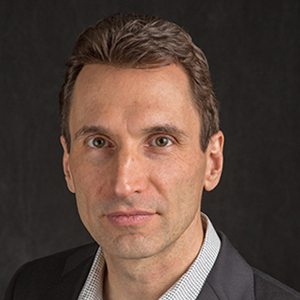
Marcel Kuijsten
Person · Author
Marcel Kuijsten is an author and the Founder and Executive Director of the Julian Jaynes Society. Since 1997, he has been building and growing the Julian Jaynes Society, a nonprofit dedicated to promoting the life and work of Julian Jaynes, a psychohistorin who wrote The Origin of Consciousness in 1976. Jaynes' theory discusses many ancient cultures and explains many mythological stories. Kuijsten has published many books on the subject matter, spoken at conferences, and provided interviews about Jaynes' work... Read more
See also: julianjaynes.org marcelkuijsten.com
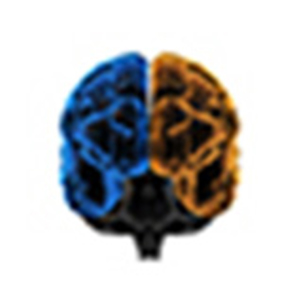
Julian Jaynes Society
Website by Marcel Kuijsten
The Julian Jaynes Society ("JJS") is an American 501(c)(3) nonprofit organization that promotes the work of Julian Jaynes, a former Princeton professor who revolutionized psychology with his book, titled The Origin of Consciousness in the Breakdown of the Bicameral Mind. The JJS was started in 1997 by Marcel Kuijsten, its Executive Director... Read more
See also: julianjaynes.org
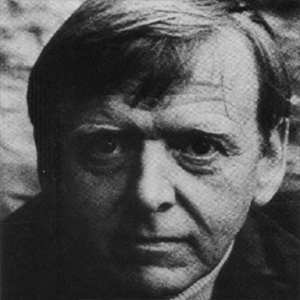
Julian Jaynes
Person · Psychohistorian
Julian Jaynes (Feb. 27, 1920 – Nov. 21, 1997) was an American researcher, psychologist, and historian. He was affiliated with Harvard, Yale, and Princeton for nearly 25 years. He is best known for his 1976 book on the origins of consciousness: The Origin of Consciousness in the Breakdown of the Bicameral Mind. According to his book, his career was dedicated to the hard problem of consciousness. His theory of the bicameral mind was an inspiration for the HBO television show Westworld ... Read more
See also: julianjaynes.org
The Origin of Consciousness in the Breakdown of the Bicameral Mind
Book by Julian Jaynes
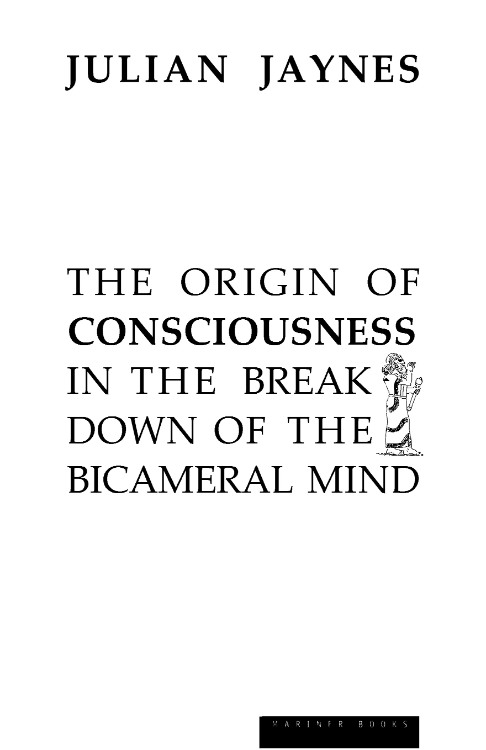
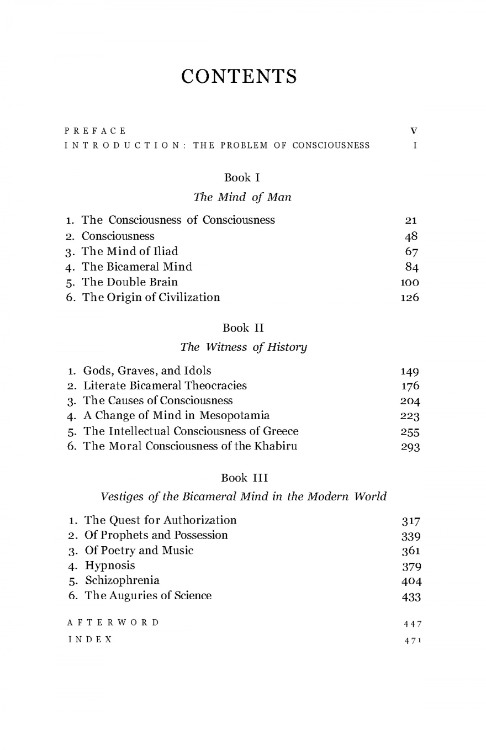
In his groundbreaking 1976 work, psychologist Julian Jaynes argued that as early as 1,000 BCE, man was not aware of himself. Instead, one side of his brain exhibited executive control through visual and auditory hallucinations during stressful situations. According to Jaynes, man thought that these were the voices of gods. As humans interacted with one another in difficult periods of migration, man became aware of himself and adopted the "bicameral voice" as his own, leaving man to wonder: why have the gods left us? The answer, according to the author, is that rational, subjective thought took the place of hallucinated voices... Read more
See also: julianjaynes.org
Iliad
Ancient Greek Hero Myth
Summary: Achilles, half man-half deity, fought in the Trojan war for King Agamemnon and quarreled with him over a mistress, among other things. The war featured the Trojans against the Greeks and had lots of action where Achilles was the star. Achilles' close friend Patroclus died at the hands of Hector; consequently, Achilles slaughtered him in order to get his revenge. While not listed in the Iliad, sources say that Achilles suffered his tragic fate at the end of the war by Paris when he was shot with an arrow through the achilles heel. Achilles fulfilled the hero motif of living a short life of glory... Read more
Odyssey
Ancient Greek Hero Myth
Summary: After the Trojan war, Odysseus sails home with his men. During his long journey, he faces challenges such as the "cyclops," the Sirens, and other fantastical creatures. He hurries home because suitors are trying to take his wife's hand in marriage. When Odysseus gets home, he wins a challenge, reclaims his life, and kills all the suitors... Read more
Psychology of English
Book by Margaret M. Bryant


Studies the psychology of the English language where grammar is among the last strongholds of the logician, the last of the sciences where certainty is thought to reign. (Source: Publisher)
Quote about "Thymos"
From Dedović, "Minds in Homer," 14–15.
"Thymos is the most common hypostatic term in Homer and its simple definition may be the seat of emotion. It appears over 700 times in Homeric works (Sullivan, 1999, p. 121). According to Jones (1909, p. 100), it appears 759 times, always in the singular ... Definition: This untranslatable word is generally defined as meaning heart, soul, and life (Autenrieth, 1895, p. 140), or soul, spirit, and feeling and thought (LSJ, 1940, p. 810)." Read online
'Minds' in 'Homer': A quantitative psycholinguistic comparison of the Iliad and Odyssey
Conference paper by Boban Dedović
"‘Minds’ in ‘Homer’" is a 2021 empirical research study on mental language in the Homeric epics which argued that the Iliad has much less mental language than the Odyssey, statistically speaking. Following peer review, the findings were accepted as a conference paper for the twelfth International Conference on the Mental Lexicon in Niagara-on-the-Lake, Ontario, Canada, from October 11–14, 2022... Read more
Conversations on Consciousness and the Bicameral Mind
Book by Marcel Kuijsten
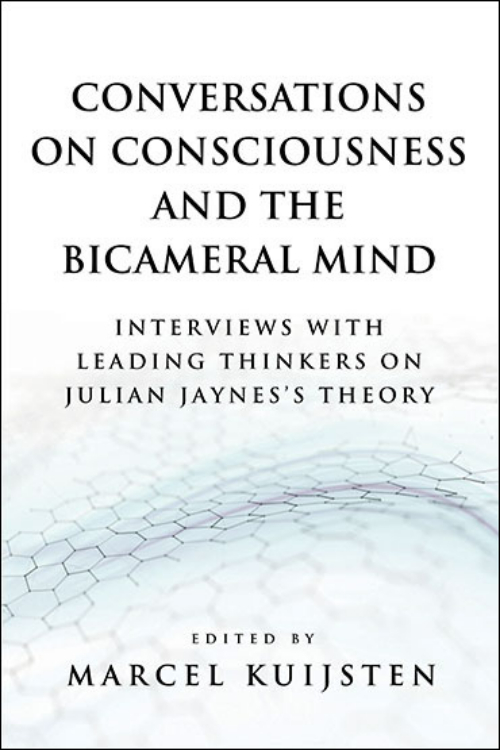

Conversations on Consciousness is a collection of transcribed interviews related to the theories of Julian Jaynes. The major focus of Jaynes' work was the origin of human consciousness. The work was compiled and edited by Marcel Kuijsten of the Julian Jaynes Society.... Read more
See also: julianjaynes.org
Heads up
This page contains a Guided Transcript
Whenever you click on a blue link that contains the panel icon chrome_reader_mode, a knowledge panel will appear on the right side of your device.
These panels provide verified, accurate information about people, books, and other things that are relevant to the discussion. The links take you to relevant websites related to source materials, as shown below:
See also: mindspace.studio
